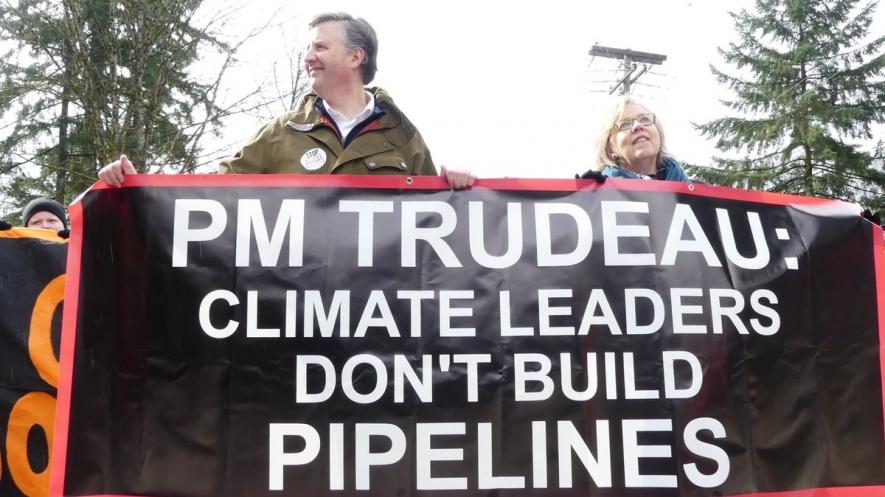Canada: Anti-pipeline Expansion Protests are Intensifying

Picture Credits: Lasia Kretzel, NEWS 1130
After the Canadian Senate unanimously passed a motion on March 22, "calling on the Prime Minister to push the project through and use the full weight of his office ensure the completion" of the proposed Kinder Morgan trans pipeline expansion, protests have been intensified by those opposing the federal government-approved $7.4 billion project to expand the existing 1,150-kilometre pipeline between Edmonton and Burnaby.
Three days after the arrest of 19 protesters which followed soon after 28 others were taken into police custody on Saturday, yesterday, on March 23, two members of parliament, Green party leader Elizabeth May and Kennedy Stewart of the New Democratic Party (NDP), were also arrested after joining the protesters and defying the Supreme court which had ordered the protesters last week to not get closer than five meters to the work site.
On being released after signing a promise to appear in court, Elizebeth May, characterizing the proposed pipeline as a “disastrous, climate-destroying” project, said that her solidarity will continue with the indigenous people, “on whose land these acts of vandalism are now being committed. Non-violent civil disobedience is the moral obligation of the climate-aware, responsible citizen.”
“I await the court ruling on the legitimacy of the permit issued to Kinder Morgan. Unfortunately, the federal government and the Texas corporation are not awaiting the ruling of the Federal Court. Kinder Morgan is committed to acts constituting irreparable harm — to the environment and to Indigenous rights.”
On the same day, about a hundred residents from Victoria also gathered, in a show of solidarity, outside the house of another M.P from NDP, Murray Rankinm who, last month, had criticized Prime Minister Justin Trudeau's commitment to ensure the completion of pipeline expansion, characterizing it as "playing Russian roulette with our coastline." In response to Trudeau's assurance that the pipeline will be built despite protests as it as a matter of national interest, Rankin, in an interview last month, had said, “British Columbia's part of the nation as well.” adding, "We have legitimate concerns about the impact of spills on our tourism industry, on Indigenous rights, on any number of fishing interests including endangered species."
Fears of accidents, spills and malpractice by Kinder Morgan are well-founded
In 2007, when a construction crew working on an inlet drive, accidentally punctured the existing pipeline of Kinder Morgan with an excavator, residents of Burnbay were witness to the "surreal" spectacle of crude oil "shooting up.. at least 30 feet high, spraying onto the roads and property, the landscaping and the trees.. The whole road was covered in black oil," recalled a resident, talking to Burnaby Now. Burnbay police, the fire department and the engineering department's emergency group were immediately mobilized and around 225 residents were advised to evacuate the area.
According to the Transportation Safety Board’s report, “The crude oil seeped into the surrounding soil, storm drains, and sewer lines. The Barnet Highway was closed for several days. Moving through the storm drain system, the crude oil eventually reached the marine waters of Burrard Inlet where it began to spread further into the inlet through wind and tide action. Burrard Inlet’s marine environment and approximately 1,200 metres of shoreline were affected by the crude oil spill. A number of shore birds were contaminated after coming into contact with the oil.”
The U.S Company, Kinder Morgan, after pleading guilty in October 2011 of “introducing waste into the environment causing pollution under the Environment Management Act”, was ordered to contribute a hundred thousand dollars to help setting up a facility to detect any digging near a pipeline and to fund workshops on digging safely.
This is not the first or the only damaging incident caused by mishaps in Kinder Morgan’s pipelines. In U.S, where Kinder Morgan is headquartered, a total of 121 incidents have occurred from 2006 until February this year, resulting in 17,598 gross barrel spillage of hazardous liquid from its pipelines, causing a total property damage of $63,192,218, according to the data released by U.S. Department of Transportation's Pipeline & Hazardous Materials Safety Administration.
A 2013 report financial research firm, Hedgeye, outlined a number of unsafe practices by Kinder Morgan, which increases the risks of accidents. "Kinder Morgan’s high-level business strategy is to starve its pipelines and related infrastructure of routine maintenance spending in order to maximize Distributable Cash Flow", the report pointed out.
Questioning the reliability and safety of Kinder Morgan’s pipelines, the report drew attention to the fact that in 2012, "Kinder Morgan acquired El Paso, then the largest natural gas pipeline company in the US, in a +$30B deal; Kinder Morgan has already cut maintenance expenses by 70-99% and maintenance [capital expenditures] by 60% on most of those assets. In our view, it is alarming that Kinder Morgan supporters believe that this is a sound business practice."
Fraudulent practices by the company have also been highlighted by Sightline institute. “Kinder Morgan has been fined by the US government for stealing coal from customers’ stockpiles, lying to air pollution regulators, illegally mixing hazardous waste into gasoline, and many other crimes.”
The company also presented a manipulative graph early this month at an investors’ meet in Toronto, plotting “Western Canada crude oil supply against pipeline takeaway capacity”, to justify the need for justify pipeline expansion to compensate for a shortfall of pipeline export capacity. This graph was debunked by National Observer, which showed if the “local refinery demand” was included in the Kinder Morgan’s calculation, it will be clear that the pipeline’s “expansion is not needed for at least a decade, if ever.”
The government of British Coloumbia, in 2016, had formally opposed the construction of another pipeline running parallel to the existing one in order to triple the capacity from 300,000 barrels to 890,000 barrels, on the grounds that adequate provisions were not made by the company to deal with the possibility of oil-spills.
However, the Prime Minister has made clear his commitment to ensure the completion of this project on the grounds that it will improve Canada’s economy and create jobs - a justification unacceptable to many critics. “Any economic benefits would be small and temporary construction jobs,” Marc Lee, Senior Economist and Director of the Climate Justice Project, has argued. “There are, however, huge economic risks from oil spills and to other sectors of the economy like fishing and tourism.”
While Canada has been widely perceived as a leader in the global fight against climate change, the Trudeau’s decision, he said, “is a complete abrogation of leadership on climate change. The prime minister is on the wrong side of history.”
“Prime Minister Trudeau is right that transition (from fossil fuels to renewable energy) requires investment, but not in the sense the prime minister intended,” Bill Carroll, co-Director of the Corporate Mapping Project and a University of Victoria sociologist, reportedly said. “If we are to transition to a post-carbon economy it makes no sense to invest in new pipelines. What we need is investment in energy systems and technologies that create good, green jobs.”
Get the latest reports & analysis with people's perspective on Protests, movements & deep analytical videos, discussions of the current affairs in your Telegram app. Subscribe to NewsClick's Telegram channel & get Real-Time updates on stories, as they get published on our website.























